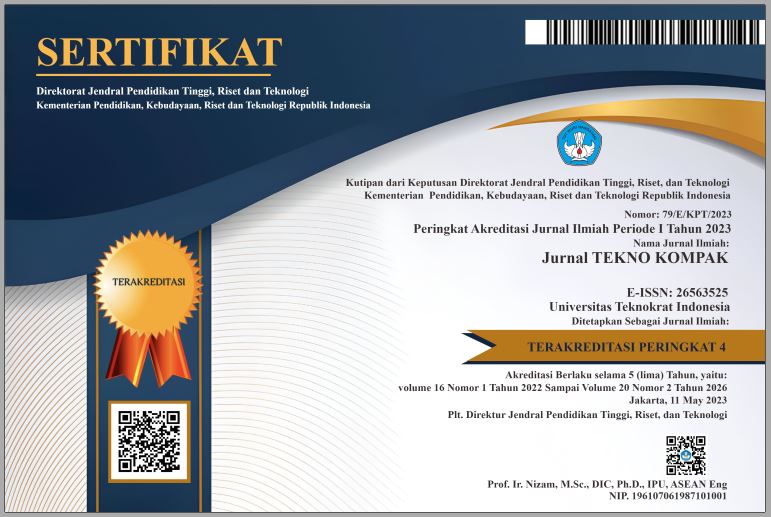Analisis Sentimen Terhadap Program Kampus Merdeka Menggunakan Algoritma Naive Bayes Classifier Di Twitter
Abstract
Full Text:
PDFReferences
D. G. Nugroho, Y. H. Chrisnanto, and A. Wahana, “Analisis Sentimen Pada Jasa Ojek Online ... (Nugroho dkk.),” pp. 156–161, 2015.
W. Yulita et al., “Analisis Sentimen Terhadap Opini Masyarakat Tentang Vaksin Covid-19 Menggunakan Algoritma Naïve Bayes Classifier,” Jdmsi, vol. 2, no. 2, pp. 1–9, 2021.
R. Rosdiana, T. Eddy, S. Zawiyah, and N. Y. U. Muhammad, “Analisis Sentimen pada Twitter terhadap Pelayanan Pemerintah Kota Makassar,” Proceeding SNTEI, no. June 2020, pp. 87–93, 2019.
D. F. Zhafira, B. Rahayudi, and I. Indriati, “Analisis Sentimen Kebijakan Kampus Merdeka Menggunakan Naive Bayes dan Pembobotan TF-IDF Berdasarkan Komentar pada Youtube,” J. Sist. Informasi, Teknol. Informasi, dan Edukasi Sist. Inf., vol. 2, no. 1, pp. 55–63, 2021, doi: 10.25126/justsi.v2i1.24.
S. Suryono and E. Taufiq Luthfi, “Analisis sentimen pada Twitter dengan menggunakan metode Naïve Bayes Classifier,” Jnanaloka, pp. 81–86, 2021, doi: 10.36802/jnanaloka.2020.v1-no2-81-86.
M. N. Ardhiansyah, R. Umar, and Sunardi, “Analisis Sentimen pada Twitter Menggunakan Metode Support Vector Machine,” Semin. Nas. Teknol. Fak. Tek. Univ. Krisnadwipayana, vol. 1, no. 1, pp. 739–742, 2019, [Online]. Available: https://jurnal.teknikunkris.ac.id/index.php/semnastek2019/article/view/343/342.
F. Ratnawati, “Implementasi Algoritma Naive Bayes Terhadap Analisis Sentimen Opini Film Pada Twitter,” INOVTEK Polbeng - Seri Inform., vol. 3, no. 1, p. 50, 2018, doi: 10.35314/isi.v3i1.335.
A. Sari, F. V., & Wibowo, “Analisis Sentimen Pelanggan Toko Online Jd. Id Menggunakan Metode Naïve Bayes Classifier Berbasis Konversi Ikon Emosi,” Simetris J. Tek. Mesin, Elektro dan Ilmu Komput., vol. 2, no. 2, pp. 681–686, 2019, [Online]. Available: https://jurnal.umk.ac.id/index.php/simet/article/view/3487.
“BELAJAR PADA JEJARING SOSIAL TWITTER MENGGUNAKAN METODE NAÏVE BAYES DENGAN SELEKSI FITUR INFORMATION GAIN SKRIPSI Oleh : MOHAMMAD ROBIH THUULUZ ZAMAN,” 2020.
N. Ruhyana, “Analisis Sentimen Terhadap Penerapan Sistem Plat Nomor Ganjil / Genap Pada Twitter Dengan Metode Klasifikasi Naive Bayes,” J. IKRA-ITH Inform., vol. 3, no. 1, pp. 94–99, 2019.
F. Tempola, M. Muhammad, and A. Khairan, “Perbandingan Klasifikasi Antara KNN dan Naive Bayes pada Penentuan Status Gunung Berapi dengan K-Fold Cross Validation,” J. Teknol. Inf. dan Ilmu Komput., vol. 5, no. 5, p. 577, 2018, doi: 10.25126/jtiik.201855983.
Samsir, Ambiyar, U. Verawardina, F. Edi, and R. Watrianthos, “Analisis Sentimen Pembelajaran Daring Pada Twitter di Masa Pandemi COVID-19 Menggunakan Metode Naïve Bayes,” J. Media Inform. Budidarma, vol. 5, pp. 157–163, 2021, doi: 10.30865/mib.v5i1.2604.
M. F. A. Bashri, “Analisis sentimen menggunakan latent dirichlet allocation dan visualisasi topic polarity wordcloud,” Semarang Univ. Diponegoro, 2017.
DOI: https://doi.org/10.33365/jtk.v17i1.2061
Refbacks
- There are currently no refbacks.
Copyright (c) 2023 Elisa Febriyani, Herny Februariyanti

This work is licensed under a Creative Commons Attribution-ShareAlike 4.0 International License.
Jurnal Tekno Kompak
Published by Universitas Teknokrat Indonesia
Organized by Program Studi D3 Sistem Informasi Akuntansi - Universitas Teknokrat Indonesia
Jl. Zainal Abidin Pagaralam, No.9-11, Labuhanratu, Bandarlampung, Indonesia
Telepon : 0721 70 20 22
W : http://ejurnal.teknokrat.ac.id/index.php/teknokompak
E : teknokompak@teknokrat.ac.id.
This work is licensed under a Creative Commons Attribution-ShareAlike 4.0 International License.
Jumlah Pengunjung : View Tekno Kompak StatsCounter
















